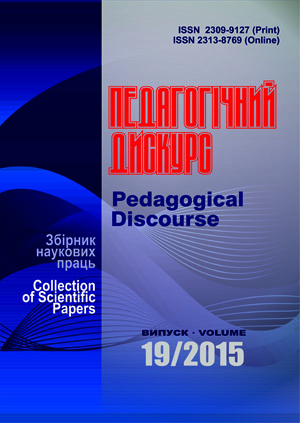Pedagogical Analisis of Conditions of Preschool Children Socialization
Abstract
The article contains theoretical analysis and pedagogical justification of pre-school children socialization conditions. The author explores and defines the notions «education», «socialization» and «social education» of a preschooler. The articles also considers the conditions and ways of a child’s social development, analyses the role of socialization institutions – a family and a pre-school educational institution – in acquiring social norms, behavior rules and social values. Some specific factors that influence the level of social competency at a preschool stage are being highlighted.
The role of the environment in the process of a child’s development can be understood through the specificity of personal perception of the reality and with account of an individual’s objective social development experience. The same life circumstance can influence the children’s development differently depending on how the child experiences this circumstance.
The research concentrates on the views of other scientists in the field of modern pedagogy. T. Ponimanska highlights the necessity to enrich a child’s social experience using the following skills: to familiarize with and be confident among the people about; to understand the emotional-behavioral factors; to choose the styles of communication and behavior with account of the social situation.
According to O. Mayer and O. Davydova, the process of a preschooler’s socialization is fully realized on the following conditions: favorable social situation; interaction between the social-pedagogical activity of a child educational institution and a family (the unity of emotional, cognitive and practical components in a child’s life; the organization of a child’s activity and communication as the main forms of interaction with the surrounding world.
Using theoretical deduction the author makes a conclusion about the most adequate and successful conditions of a child’s socialization, works out the recommendations about the content of a preschooler’s social development. It is recognized that a person’s self-consistency, leadership and creativity are the main criteria of social development. It is proved that socialization is an integral component of a child’s intellectual development; the mastering of social experience, the system of communication and interpersonal relations, and behavioral norms are the necessary factors of a person’s productive life and activity in today’s developing space.
Downloads
References
Bodalev A.A. Socialʼnaya sreda i formirovanie rebenka kak lichnosti i subʼʼekta deyatelnosti (Social environment and a formation of a child as a personality and the subject of activity), Morozova O.P., Hrestomatiya po pedagogike, 1997, pp. 47–49. [in Russian]
Bozhovich L.I. Lichnostʼ i eyo formirovanie v detskom vozraste (Personality and its formation in childhood), Prosveshhenie, 1968, p. 398–464. [in Russian]
T.A. Danilina, T.S. Lagoda, M.B. Zujkova. Vzaimodejstvie doshkolʼnogo uchrezhdenija s sociumom (Interaraction of a preschool institution with society), 2003. [in Russian]
N.F. Vinogradova. Vospitatelyu o rabote s semʼej (Teachers manual about the working with a family), 1989. [in Russian]
Golovanova N. F. Socializacija vospitanija rebenka (Socialization of a child upbringing), Rechʼ, 2004. [in Russian]
Gurova R. G. Sociologicheskie problemy vospitanija (Sociological issues of upbringing children and society: socialization of preschool and early school age children), 1981. [in Russian]
Bohush A.M., Varianytsia L.O., Havryk N. V. Osoblyvosti sotsializatsii ditei doshkilnoho ta molodshoho shkilnoho viku (Features of socialization of preschool children and primary school age ), Luhansk, 2006, 368 p. [in Russian]
T.N. Doronova, E.V. Solovʼeva, A.E. Zhichkina, S.I. Musienko. Doshkolʼnoe uchrezhdenie i semʼja – edinoe prostranstvo detskogo razvitija (Preschool institution and family a common space of a childʼs development), 2001. [in Russian]
Krivov Ju.I. Problema socializacii podrastajushhih pokolenij v zarubezhnoj pedagogike (The problem of socialization of new generations in foreign pedagogy), 1992, р. 8–15. [in Russian]
Kolomijchenko L.V. Koncepcija i programma socialʼnogo razvitija detej doshkolʼnogo vozrasta (The concept and programme of preschool children social development), 2004, Vol. 5, pp. 8-28. [in Russian]
Kravchenko T. V. Sotsializatsiia osobystosti i sotsialne seredovyshche (Socialization of a personality and the social environment) Teoretyko-metodychni problemy ditei ta uchnivskoi molodi, 2006, issue 9, pp. 23–29. [in Ukranian]
Ponimanska T.I. Dytyna i sotsium (The child and society), 2004, Vol. 8, pp. 4-6. [in Ukranian]
Поніманська Т.І. Люди і я. Світ дорослих як чинник соціалізації особистості дитини / Т.І. Поніманська // Дошкільне виховання. – 1999. – № 8. – С.14–15. / Ponimanska T.I. Liudy i ia. Svit doroslykh yak chynnyk sotsializatsii osobystosti dytyny (People and I. The world of the adults), 1999, Vol. 8, pp. 14–15. [in Ukranian]
Lukashevych M.P. Sotsializatsiia. Vykhovni mekhanizmy i tekhnolohii (Socialization. Upbringing mechanisms and technologies), 1998, 112 p. [in Ukranian]

















